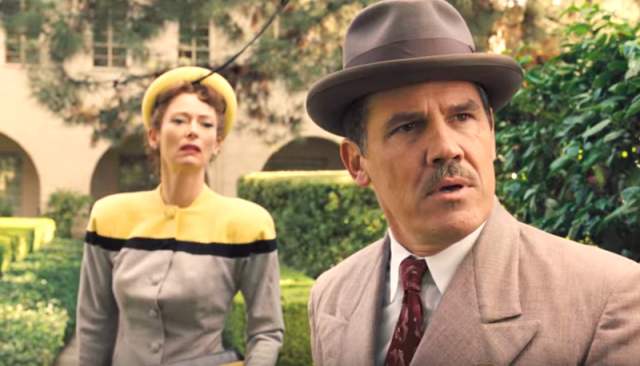
Joel and Ethan Coen are Jewish, but the only one of their films to focus on the subject of faith directly is “A Serious Man,” in which the conclusion they reach is “accept the mystery” — i.e., you’re never gonna figure it out; whatever will happen will happen, so quit worrying. That theme is also found in “No Country for Old Men” (“You can’t stop what’s comin'”) and “Inside Llewyn Davis,” where the title character faces the fact that his difficult, uncertain life might not ever get any easier.
So where, then, do the Coen brothers suggest we look for meaning in this random, capricious universe? “Hail, Caesar!” tells us where they find theirs: in the movies. Movies are the Coens’ religion, and they’re two of the best theologians currently working.
“Hail, Caesar!,” a half-speed screwball comedy set in Hollywood in 1951, is like the Bible of Coen brothers movies: a greatest-hits compilation of things they’ve done before that, taken as a whole, sort of suggests a unified theme, kind of. Our uncertain protagonist this time is Eddie Mannix (Josh Brolin), a mid-level executive at Capitol Pictures whose job is to wrangle the studio’s stars and manage their public images. It is a 24-hour-a-day job, and Mannix is exhausted. When we meet him, he’s in the process of being headhunted by Lockheed, an aviation company that wants to lure him away with more money, less stress, and greater job security than he has at Capitol.
That’ll have to wait, though, because today Mannix is up to his elbows in Tinseltown troubles. Hollywood legend Baird Whitlock (George Clooney), star of the Roman/Biblical epic “Hail, Caesar!” now shooting, has disappeared from the set, and competing twin gossip columnists Thora and Thessaly Thacker (both Tilda Swinton) are snooping. DeeAnna Moran (Scarlett Johansson), an Esther Williams-y bathing beauty, is newly pregnant and unmarried. Singing cowboy Hobie Doyle (Alden Ehrenreich), an authentic hick, has been reassigned to a period drama directed by the effete Laurence Lorenz (Ralph Fiennes), who says the kid can’t act.
Oh, but there’s plenty more, too. When Mannix, a devout, confession-every-day Catholic, assembles some religious leaders to discuss the depiction of Jesus in “Hail, Caesar!,” he finds their different explanations of God’s nature confusing, contradictory, and unhelpful. (“God doesn’t have any children,” says the Jewish representative. “He’s a bachelor. And he’s very angry.”) And Mannix doesn’t even know about the other impending crisis, wherein a secret cabal of Hollywood Communists are trying to get some star power on their side by any means necessary.
Sounds zany, right? It does have a few madcap moments, and more than a few very funny scenes. But it’s never as full-on screwball as it seems on paper, never as zippy and energized as you’d expect from the plot description. That’s because the ever-inscrutable Coens weren’t content to make a light, silly Old Hollywood comedy. They also wanted to revisit some of their deeper existential and spiritual themes, using Hollywood of the ’50s — one of the most shallow and artificial settings imaginable — as the backdrop. These weightier matters throw the film off-kilter, giving it a weird vibe that perplexed me almost as often as it entertained me.
The Coens seem to get a kick out of filtering 1950s Hollywood through their own arch, semi-ironic sensibilities and recreating it lavishly on the screen. And when it comes to recreating the production numbers that a studio like Capitol Pictures would have been filming in 1951, the Coens use no irony at all. There’s an aquatic ballet with Johansson and a musical number with a tap-dancing Channing Tatum, both shown in their entirety, neither one a parody. There’s no reason to show these whole sequences. (No narrative reason, I mean. Johansson is dressed like a mermaid and Tatum is dressed like a sailor. Obviously there are reasons.) Their inclusion, and the fact that they’re produced with such attention to detail, suggests genuine affection on the filmmakers’ part. It’s a rare indulgence (and a perfectly delightful one) from storytellers known for being unsentimental and efficient.
It’s tempting to call “Hail, Caesar!” frivolous, and I suspect the Coens will be perversely pleased when people do. But unlike, say, “Burn After Reading” or “The Ladykillers” (to name two Coen films that truly don’t have much on their minds), “Hail, Caesar!” hints at bigger ideas and deeper layers. Almost every film of theirs in the last 10 years has worked better for me on second viewing, possibly because the Coens are smarter than I am (please note that this is not true of all, or even most, filmmakers). This one will probably be the same. I look forward to finding out!
P.S. Despite the presence of bigger stars, the standout is Alden Ehrenreich as the aw-shucks Western actor. Whether trying in vain to communicate with Laurence Lorenz, helping Eddie Mannix find Baird Whitlock, or twirling a lasso to kill time while waiting for his studio-arranged date to a premiere, Ehrenreich effortlessly steals every scene he’s in. He’s a great surprise, especially insofar as he balances out a more disappointing one: you’re going to feel like you didn’t get enough Clooney, Tatum, Johansson, Fiennes, Frances McDormand (who plays a film editor), or Jonah Hill (a studio lawyer). I guess that’s the problem with being such great filmmakers that you attract a huge roster of top Hollywood talent eager to work with you: finding enough for them all to do.
B (1 hr., 40 min.; )





